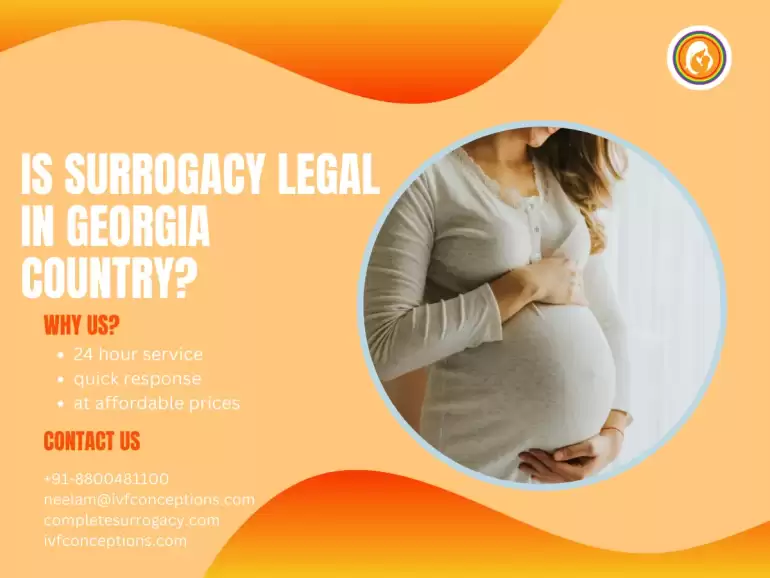Is surrogacy legal in Georgia Country?

Yes, surrogacy laws in Georgia are most favorable for IPs. The Republic of Georgia (an eastern European country) is quickly becoming a favorite global surrogacy destination for childless couples. One of the primary reasons why it is a popular destination is due to its clear and well-established legal framework. In this guide we will learn about current or updated surrogacy laws in Georgia.
Surrogate motherhood, along with egg and sperm donation, became legally permissible in Georgia in 1997 when the “Law on Healthcare of Georgia” incorporated provisions related to “surrogate motherhood.”
- Book an online appointment: Get a free online consultation.
- Call\W:+91-8800481100 Email:neelam@ivfconceptions.com
In 2014, as surrogacy arrangements became increasingly commercialized, the Georgian government contemplated amending the laws to prohibit compensating surrogates for their services. However, these proposed changes were never implemented, leaving commercial surrogacy legally permitted under the current regulations in Georgia.
Important: The Georgian government has announced it intends to pass legislation that would ban surrogacy for foreigners starting January 1, 2024.
Pls Note: As of March 12, 2024, Parliament has not enacted this law. We will update on this issue when more information comes available. Currently, the law is in draft form and several issues related to surrogacy services.
However, we do offer surrogacy in Georgia and Armenia, so in case if surrogacy closes legally in Georgia, we can continue with the process and birth in the Armenia without any inconvenience to the intended parents. Contact us to learn more.
Additional Guides for Surrogacy in Georgia
What are the Starting Steps for Surrogacy Process in Georgia?
How Much Does Surrogacy Cost in Georgia Country
Surrogacy for Hetero Couples in Georgia Europe
Key aspects of Georgia’s surrogacy program include:
- Relatively affordable surrogacy cost in Georgia
- Parental rights automatically assigned to the intended biological parents.
- Expedited process for obtaining documentation for the child
- Allowance for foreign intended parents to engage surrogates in Georgia
- Contractual agreements govern the relationship between intended parents and surrogates
- Surrogacy services restricted exclusively to heterosexual couples with medical grounds necessitating this option. Surrogacy for gay couple or single male is not allowed in Georgia.
Despite considerations to ban compensated surrogacy, the laws in Georgia continue to facilitate commercial surrogacy arrangements, making it an accessible destination for intended parents from abroad seeking such services at the present time.
Surrogacy laws in Georgia Country
Yes, surrogacy is legal in Georgia. Surrogacy is permitted in Georgia only gestational surrogacy (where the surrogate has no genetic connection to the child) is allowed. Commercial gestational surrogacy agreements is possible in Georgia and both surrogate mother and intended parents must meet certain eligibility criteria, such as being legally married.
It’s important to note that surrogacy laws and regulations can change, and it’s advisable to consult with a qualified attorney specializing in reproductive law for the most up-to-date information and guidance on navigating the legal process in Georgia.
Legal issues with Surrogacy in Georgia

It’s important to note that while surrogacy is legal in Georgia, there are strict regulations governing the process, including eligibility criteria for intended parents and surrogates, mandatory psychological evaluations and counseling, medical screening requirements, and limitations on surrogate compensation.
Additionally, surrogacy agencies and clinics operating within the country must comply with licensing and accreditation requirements, ensuring adherence to ethical practices and the protection of all parties involved.
Georgia does not have any specific laws that invalidate or prohibit surrogacy contracts. Therefore, it is crucial for all parties involved – the intended parents, the surrogate, and any other third parties – to formalize a legally binding contract agreement before a local notary public.
An experienced surrogacy lawyer can guide and assist in drafting comprehensive legal documents that outline the expectations, compensation, responsibilities, potential risks, and liabilities for each party prior to initiating the medical procedures for surrogacy and intended family formation.
Third-party reproductive arrangements, including surrogacy, have been legally permitted in Georgia since 1997. This regulatory framework provides equal opportunities for both local Georgian citizens as well as international intended parents seeking fertility solutions.
Over time, Georgia has emerged as a prominent surrogacy destination for couples looking to build their families through the surrogacy process, capitalizing on the country’s permissive legal environment.
Explore our complete guide to international surrogacy in Georgia to learn.
Is surrogacy legal in Georgia Country?
Yes, surrogacy is legal in Georgia and currently hetero couples globally can participate in surrogacy services in Georgia, Europe. According to Georgian legislation, commissioning parents are the legal parents of the baby right from conception, and their name comes on the birth certificate.
Article 143 of Georgia legislation says,
- Extracorporeal fertilization (IVF) is allowed:
- For the treatment of infertility, as well as in the case of risk of transmission of genetic disease on a wife’s or a husband’s part, by using sex cells or an embryo of the couple or a donor, if the couple’s written consent has been obtained.
- For transfer and growth of the embryo obtained as a result of fertilization to the uterus of another woman (“surrogate mother”). The couple’s written consent is obligatory.
- The couple is considered to be parents in case of childbirth with the responsibility and authority ensuing from it. A donor or a “surrogate mother” has no right to be recognized as a parent of the born child.
- Prior written consent is needed from the Intended parent before the start of the treatment. A duly drafted and signed consent provides legal protection to the Intended Parents.
Article 144 of Georgia legislation says,
Article 144 gives the possibility of using an egg donor and sperm donor. For artificial fertilization, it is possible to use female and male sex cells or an embryo conserved by the method of freezing. The time of conservation is determined according to the couple’s will by established procedure.
Georgia surrogacy laws
The surrogate mother in Georgia has no right over the child, and she is not recognized as the rightful parent. This means:
- The birth certificate can be assigned soon after the delivery.
- The name of both commission parents comes on the birth certificate.
- No consent from a surrogate mother is needed at any stage and no court order is needed.
Intended Parents need to have at least one genetic link with the child. That means either the mother or father needs to be biologically linked with the baby. During the exit process, your country consulates will ask for DNA tests to establish that get the citizenship of the parents.
It is a small country, some countries do not have embassies in Georgia. That is why couples need to find and communicate with the nearest diplomatic mission to get citizenship and a passport for the baby.
The exit process:
Babies born to foreign couples are considered to be stateless. The baby remains stateless till the time parents apply and get citizenship of their country.
The baby exit time from country to country. It depends on the workload of your country’s local embassy and if there are any holidays. Generally, the time needed for exit are:
US citizens: 2-4 weeks
UK citizens: 8-10 weeks
Australian citizens: 5-6 weeks
Surrogate Mother Requirements in Georgia
Since gestational surrogacy is allowed in Georgia with no specific laws prohibiting these procedures. All intended parents undergo gestational surrogacy in Georgia and successfully build their families. Therefore, to proceed with surrogacy in Georgia there are certain requirements for the surrogate mother (gestational carrier). They are in place for surrogate safety, the safety of the baby, and the legal safety of the intended parents. which are mentioned below:
Legal Framework Around Surrogacy in Georgia
The legal framework for surrogacy in Georgia is primarily governed by the “Law of Georgia on Health Care” and the “Order of the Minister of Labor, Health and Social Affairs of Georgia on Approval of Biomedical Rules for the Use of Assisted Reproductive Technology.”
These laws and regulations provide guidelines and requirements for surrogacy arrangements in Georgia, ensuring the protection of all parties involved and promoting ethical practices.
Eligibility Criteria for Intended Parents in Georgia:
- Must be legally married or have at least one year of partnership with proven documents
- Must have a medical need for surrogacy (e.g., infertility, genetic disorders)
- Must undergo psychological evaluation and counseling
Requirement for Surrogate Mother Requirements in Georgia:
- Age between 25 and 35 years old
- Healthy and able to carry a pregnancy
- Have given birth to at least one child previously
- Undergo psychological evaluation and counseling
- Provide medical history and undergo medical screening
The legal framework in Georgia aims to strike a balance between enabling access to surrogacy services while ensuring the rights and well-being of all parties involved are protected through comprehensive regulations and oversight.
Under Georgian law, the intended parents in a gestational surrogacy arrangement are recognized as the legal parents of the child.
More Resources to Read:
Guaranteed Surrogacy in Georgia
How Does Gestational Surrogacy Work in Georgia? Step-by-step Guidance
Surrogate Mother Cost in Georgia
Surrogacy ban in Georgia- Update
The Georgian government has signaled its intention to enact legislation banning surrogacy arrangements for foreign intended parents, slated to take effect on January 1, 2024. However, as of March 12, 2024, this proposed law has not yet been formally passed by the Parliament.
If enacted, violating this surrogacy ban would constitute a criminal offense under Georgian law. The current draft form of the legislation leaves several key aspects unresolved, such as how pre-existing surrogacy contracts with assisted reproductive technology (ART) facilities and surrogates in Georgia will be treated. These crucial details will only come to light once the final law is officially passed.
Conclusion
In conclusion, Georgia has established a comprehensive legal framework that allows for both gestational and commercial surrogacy arrangements, while also implementing safeguards and regulations to ensure the well-being of the intended parents, surrogates, and the resulting children.
Navigating the legal intricacies of surrogacy in Georgia requires careful consideration and consultation with qualified reproductive law professionals.

If you’d like to learn more about IVF, Egg Donation, or surrogacy services globally, check out the rest of our website at Complete Surrogacy. We offer legally secure and affordable surrogacy consulting services for FREE.
Our team has over 14 years of experience facilitating surrogacy arrangements, egg donation, and serving as an advocacy resource for infertile couples and LGBTQ individuals seeking to build families.
For more resources on IVF and Surrogacy, browse our other web page- IVF Conceptions
More reference:
https://www.aljazeera.com/features/2023/9/6/georgia-plans-to-ban-commercial-surrogacy
https://ge.usembassy.gov/message-for-u-s-citizens-new-law-banning-surrogacy-planned-in-georgia/
